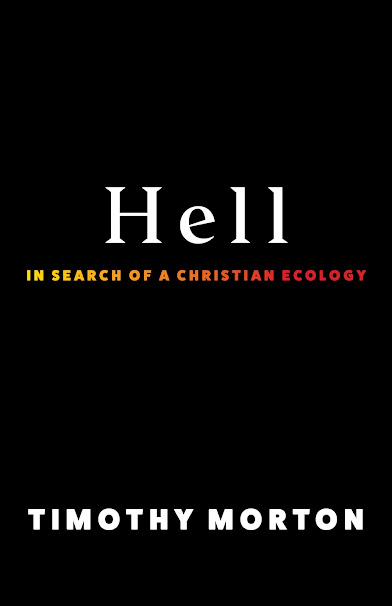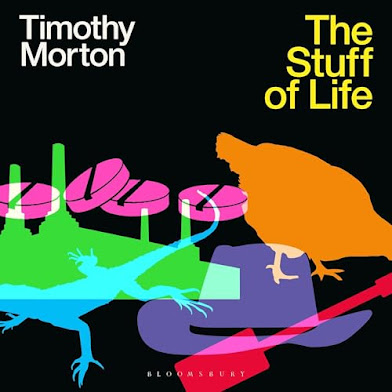The hour I spent with Verso, talking about my work:
“Was not their mistake once more bred of the life of slavery that they had been living?—a life which was always looking upon everything, except mankind, animate and inanimate—‘nature,’ as people used to call it—as one thing, and mankind as another, it was natural to people thinking in this way, that they should try to make ‘nature’ their slave, since they thought ‘nature’ was something outside them” — William Morris
Monday, August 23, 2021
THE REMIX OF HEAVEN AND HELL
I Wrote a Book with Björk

“A magical booklet of emails between Björk and philosopher Timothy Morton is a wild, wonderful conversation full of epiphanies and sympathies, incorporating Michael Jackson, daft goths and the vibration of subatomic particles in its dizzying leaps, alive with the thrill of falling in love with someone’s brain.” (Emily Mackay, NME)
WELLEK LECTURES
Dark Ecology: three theory lectures at Irvine, May 21–23, 2014 in the lineage of Derrida, Cixous, Sloterdijk, Butler, Baudrillard, Lyotard, Jameson and Anderson.
Timothy Morton

Timothy Morton is Rita Shea Guffey Chair in English at Rice University. They have collaborated with Laurie Anderson, Björk, Jennifer Walshe, Hrafnhildur Arnadottir, Sabrina Scott, Adam McKay, Jeff Bridges, Justin Guariglia, Olafur Eliasson, and Pharrell Williams. Morton co-wrote and appears in Living in the Future’s Past, a 2018 film about global warming with Jeff Bridges. They are the author of the libretto for the opera Time Time Time by Jennifer Walshe. Morton has written All Art Is Ecological (Penguin, 2021), Spacecraft (Bloomsbury, 2021), Being Ecological (Penguin, 2018), Humankind: Solidarity with Nonhuman People (Verso, 2017), Dark Ecology: For a Logic of Future Coexistence (Columbia, 2016), Nothing: Three Inquiries in Buddhism (Chicago, 2015), Hyperobjects: Philosophy and Ecology after the End of the World (Minnesota, 2013), Realist Magic: Objects, Ontology, Causality (Open Humanities, 2013), The Ecological Thought (Harvard, 2010), Ecology without Nature (Harvard, 2007), 8 other books and 250 essays on philosophy, ecology, literature, music, art, architecture, design and food. Morton’s work has been translated into 10 languages. In 2014 they gave the Wellek Lectures in Theory.
Comments
You are welcome to comment by leaving your full name or a way to find your full name with one or two clicks, and/or an email address.
Translate
Search the Blog
Loading
Zermelo-Fraenkel Free Zone

“Outstanding.”
—Slavoj Zizek, In Defense of Lost Causes
“Dark ecology has the potential to be the punk rock or experimental pop of ecological thinking.”
—Kasino A4
“It isn’t [nature] itself that needs trashing — we’re doing a fine job of that already; it’s our way of thinking about it that needs to be structurally realigned ... it's an important book that, in a scant 205 pages of main text ... frames a debate that no doubt will be carried on for years to come.”
—Vince Carducci, Pop Matters
“He practices what he theorizes: nothing is wasted in his argumentation.”
—Emmanouil Aretoulakis, Synthesis
—Slavoj Zizek, In Defense of Lost Causes
“Dark ecology has the potential to be the punk rock or experimental pop of ecological thinking.”
—Kasino A4
“It isn’t [nature] itself that needs trashing — we’re doing a fine job of that already; it’s our way of thinking about it that needs to be structurally realigned ... it's an important book that, in a scant 205 pages of main text ... frames a debate that no doubt will be carried on for years to come.”
—Vince Carducci, Pop Matters
“He practices what he theorizes: nothing is wasted in his argumentation.”
—Emmanouil Aretoulakis, Synthesis
“Picking up where his most obvious predecessors, Gregory Bateson and Felix Guattari, left off, Morton understands mental ecology as the ground zero of ecological thinking, as that which must be redressed before anything else and above all. Morton goes beyond both his forebears, however, in repairing the rift between science and the humanities, which the Enlightenment opened up and against which Romanticism reacted. Perhaps most pleasantly surprising, given its erudition, is that in its stylistic elegance The Ecological Thought is as satisfying to read as it is necessary to ponder.”
—Vince Carducci
—Vince Carducci
Blog Archive
-
▼
2021
(83)
-
▼
August
(12)
- Book of Architecture Essays
- Hyperobjects in Buddhist Door
- Reaction Reaction Reaction: It Was Too Progressive...
- Reaction Reaction Reaction: It Was Too Progressive...
- All Art Is Ecological Is Out and It's a Bestseller
- Reaction Reaction Reaction: It Was Too Progressive...
- Three Thousand
- This Really Is Nice
- So Copenhagen Put the Conference Online Only, but ...
- Statues and Interviews
- Yes, UK, You Should be "Treating" "Incels" "as a f...
- AMOR MUNDI
-
▼
August
(12)
CounterShareThis |


















